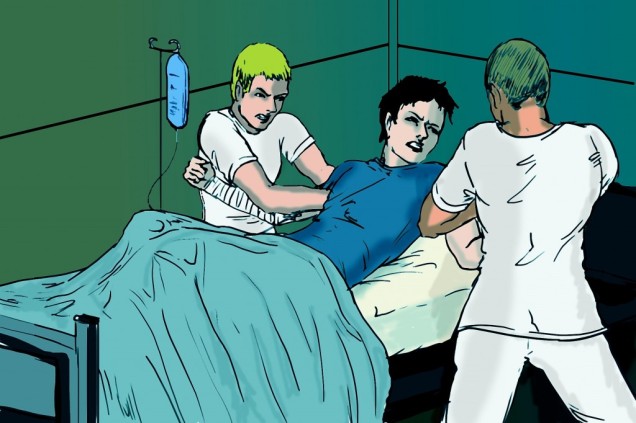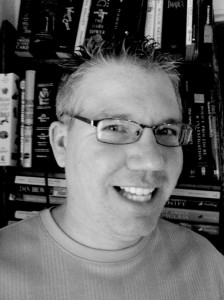
Note from R.L. Stollar, HA Community Coordinator: I am honored to interview M Dolon Hickmon, author of the brand new novel “13:24,” for HA You can read my review of his novel here. Hickmon is a child abuse survivor, a writer and an anti-abuse activist. He married his wife in 2007, and they have one daughter together. He dedicates his time and skills to advocating on behalf of mistreated children, often in cooperation with children’s rights groups and other advocates. Learn more about him at his book’s website here.
*****

HA: Thank you for being willing to do this interview. Can you tell us a bit about your personal background?
MDH: My parents were ‘saved’ in an Independent Baptist church when I was between three and four years old. It was a high-control group, with a family model based on male dominance. My earliest memories are of beatings and of witnessing domestic violence. Our pastor’s solution to spouse- and child abuse was to call for perfect obedience, so that the family head would have no reason to be provoked. Fortunately my mother kept trying until she found a secular psychologist who helped convince our abuser to leave that church.
HA: 13:24 is an intense, brutal, and deeply personal — yet vastly accurate — read. What inspired you to write it?
MDH: The easiest way to answer that is with a comparison: Thirty years ago, child molesters were pictured as violent rapists, who attacked unwary strangers. Victims were expected to make an immediate outcry. Meanwhile, accusations against coaches, parents, or priests were met with disbelief, or dismissed as bizarre flukes. Today, we know that society had those percentages backwards; it was actually stranger attacks that were a vanishing minority. But it took decades for sexual abuse survivors to convince schools, churches, police officers, prosecutors and judges that their policies were based on bad assumptions.
Today, on the subject of physical abuse, society is where we were on sexual abuse fifty years ago. Our entire system of thought is based on a set of almost clownish stereotypes. 13:24 exposes our false assumptions. It is based on real crimes, on real science, and on real survivors’ experiences. But what makes it disturbing is that when people are exposed to the truth, they immediately realize that our entire culture is off in the woods, when it comes to dealing with this problem. We are fighting imaginary boogeymen, while the actual perpetrators walk free among us.
HA: There are so many different ways you could have written something powerful about your personal experiences and the impressive amount of research you have done of the subject of religiously-motivated physical abuse. What attracted you to a novel as your method of delivery?
MDH: Outside of therapy groups, discussions of physical abuse tend to be dominated by the opinions of people who have not experienced it. These people are often kindhearted and well intentioned, but their understanding of the problem is shallow. It’s hard to address their mistaken beliefs, because they hold the majority and agree with one another. The novel is unique because we remember what we’ve read as if it were a personal experience. I think this is the key—for the majority to have a way of adding the victims’- and survivors’ perspective to their pool of shared experience.
HA: It has been noted — by people who grew up in cultures similar to the ones you describe in your book — how uncannily accurate your descriptions are of certain thought-patterns and sociopolitical realities within conservative American evangelical worlds. You also go into great detail about police and social work. Can you describe what your research process was and how long it took?
MDH: Often, it was as easy as Googling a phrase that I recalled my abuser had said. I also consulted with quite a few authorities, including a psychologist and trauma researcher, a retired vice detective, an active Postal Inspector, a working dominatrix, a police dog trainer, and others.
HA: Even though you tell the story through words in a novel, you really paint a vivid picture of Rehoboam’s music — lyrics, rhythm, melodies, even what their live performances feel and sound like. Why did you place such an emphasis on music?
MDH: In several instances, readers see an instigating childhood experience, and then discover through Josh’s lyrics how his adult mind has processed that event. However, the music is also part of a much bigger social dilemma: When a teenager commits murder, society is quick to consider to the influence of music, television or videogames; but when innumerable parents discipline their children to death, people are reluctant to examine the claims that are being made in the parenting advice that all of them read. I don’t know the answer, but I found the double-standard interesting to consider.
HA: 13:24 ends on an emotionally somber note: neither prescriptively hopeful, nor necessarily hopeless. Without giving anything away, can you talk about why you chose to end on the particular emotional note you did?
MDH: People who overcome child abuse are remarkable, because they have accomplished something that is both difficult and rare. I think the media belittles that accomplishment by making it seem as if every child abuse victim overcomes and is stronger for that experience, in the end. The reality is that there are a lot of unhappy endings. Children die, and those who survive often wind up addicted, or in prison; they make messes of their marriages, and do regrettable things to their own kids. I think 13:24 offers readers a balanced ending, which reflects the range of responses that are normal for human beings.
HA: In your discussion of religiously-motivated physical abuse, both in the novel and elsewhere, you hold nothing back in pointing to how pervasive the relevant problems are: existing not only private schools and home schools, but also public schools. What are some facts you think are important for homeschool advocates in particular to know about parallel problems in private and public schools? And how can or should we work together to address these problems?
When it comes to sexual abuse, we now realize that it is not enough for adults to be watchful and protective; children must be taught to protect themselves, because when abuse occurs, it is usually only the victim and the perpetrator in the room. We need a similar revolution in our thinking about physical abuse. You can’t leave it to parents, because abusers are never going to willingly give victims advice on how to escape. So whether you are a pastor, a neighbor, or family member, the obligation is for all adults to appropriately discuss physical abuse with the children they come in contact with. Kids should know that discipline does not leave children injured or scarred, or feeling worthless or terrified.
HA: One of my favorite sections in 13:24 was the “group therapy” scene were characters talk about the real physiological impacts trauma can have on the body, particularly the brain. Do you think there’s any connection between religious fundamentalists’ fear of taking mental health issues seriously and their unwillingness to talk about child abuse?
MDH: The church is certainly not the only institution that is failing to fully address those two issues. But given that corporal punishment is no longer recommended by any group of secular experts, I think the responsibility is now on pastors to be proactive in educating very young church members about the difference between discipline that is constructive, and physical abuse, which only contributes to mental health problems, substance abuse and rebellion.
HA: What’s next for you? Are you writing another novel?
MDH: I am in the pre-planning stages for a second novel. This one will also deal with abuse and spiritual themes.
HA: Thank you once again for doing this interview. Any closing thoughts?
MDH: I would like to ask everyone to consider how your own conversations about child discipline might seem to a child who is being physically abused. Are you explaining correction so that a five- or nine year old abuse victim can understand when she needs help? Do your words convey that abuse is unacceptable and that other adults will believe and protect? Because if you are not teaching kids to protect themselves from physical abuse, who will?
*****
Homeschoolers Anonymous is pleased to announce that we are teaming up with M Dolon Hickmon to give away free hard copies of his powerful new novel, 13:24. Click here for information on how to enter.
Sounds fascinating. I hope the ending isn’t TOO much of a downer. I very much want to be a part of a redemptive solution for the myriad of problems surrounding abuse.
LikeLike
Well I don’t want to give the ending away. 🙂 But I wouldn’t call the ending depressing any more or less than I’d call it hopeful. It’s more… an ending that provokes somber and sober reflection.
LikeLike